人教版必修二unit 2 The Olympic Games language points课件(共29张PPT)
文档属性
| 名称 | 人教版必修二unit 2 The Olympic Games language points课件(共29张PPT) | 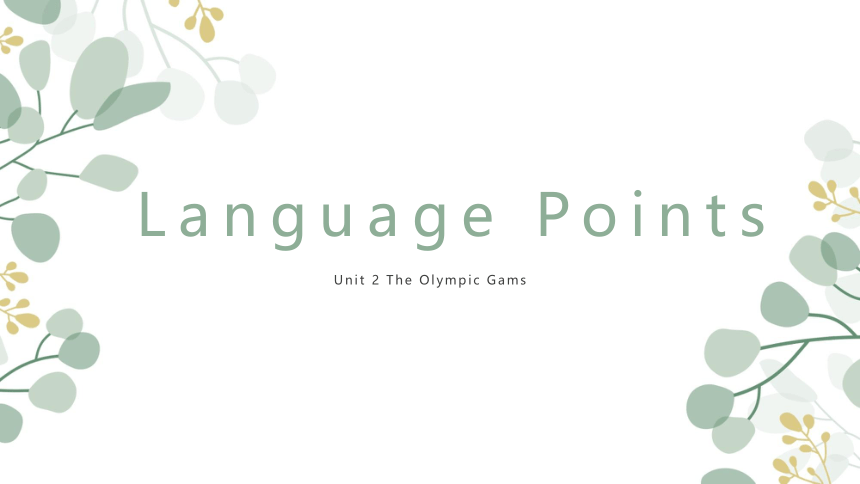 | |
| 格式 | pptx | ||
| 文件大小 | 16.6MB | ||
| 资源类型 | 教案 | ||
| 版本资源 | 人教版(新课程标准) | ||
| 科目 | 英语 | ||
| 更新时间 | 2021-02-02 11:56:09 | ||
图片预览


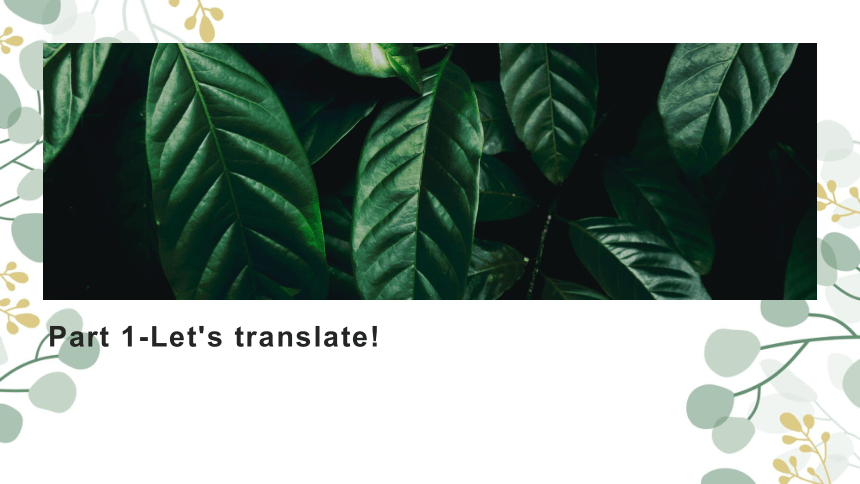
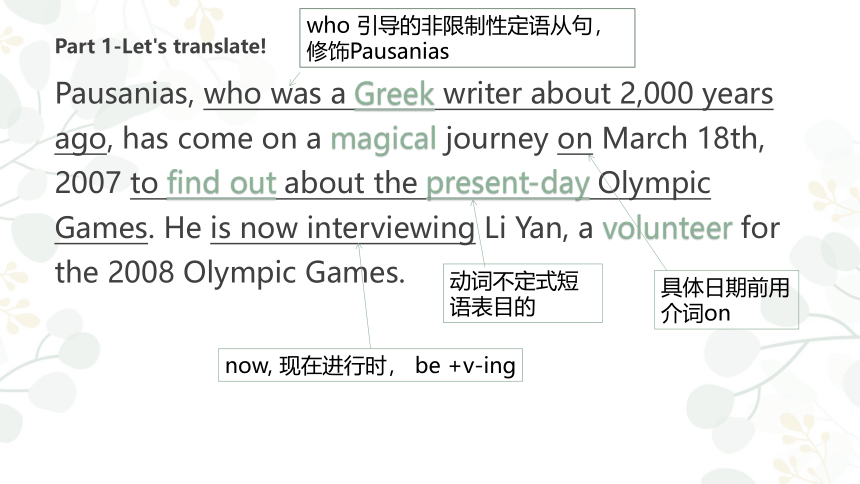
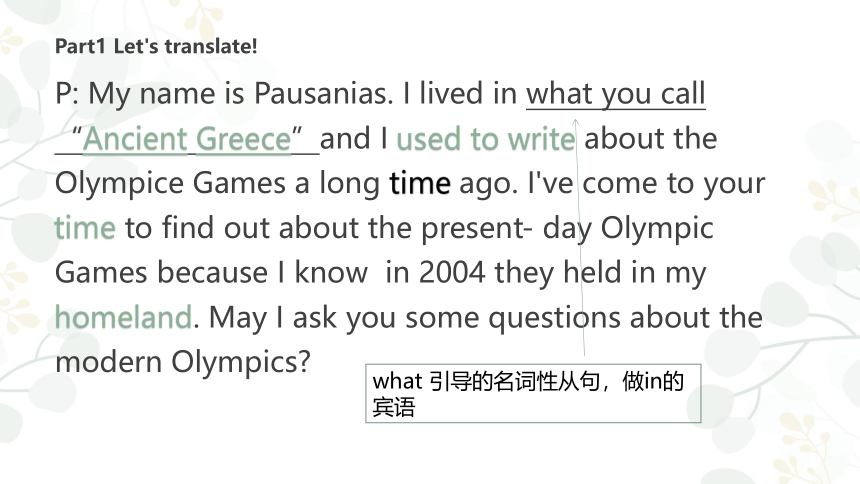
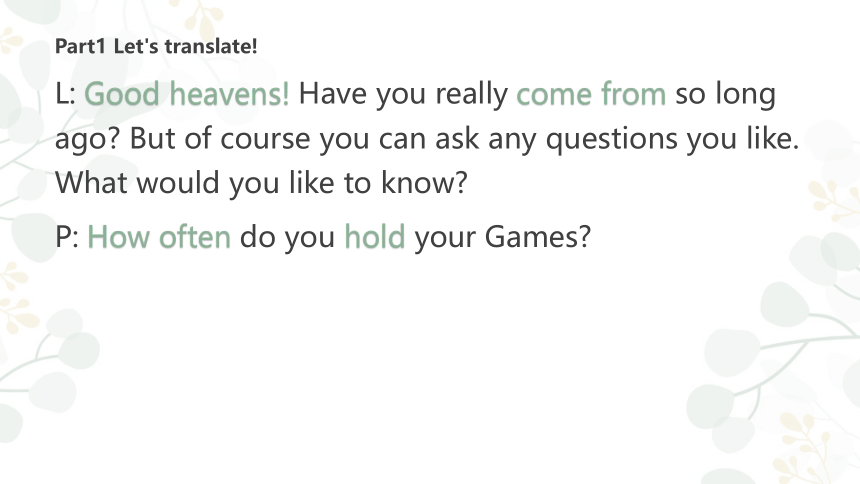
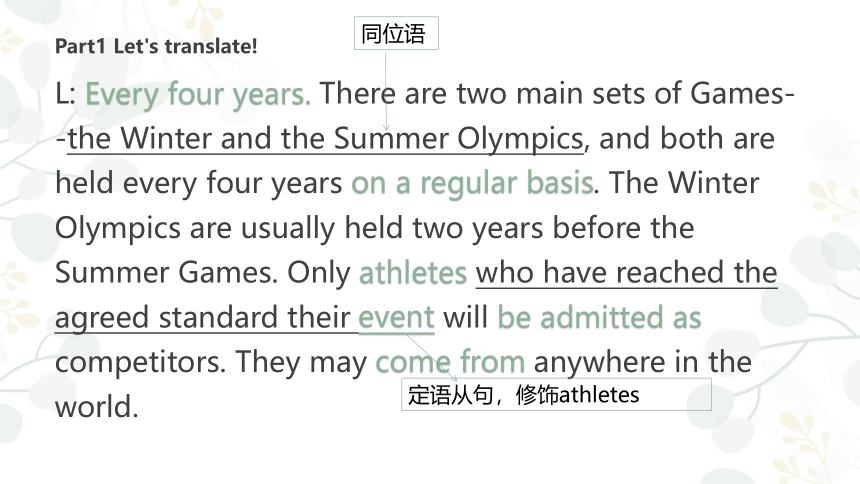
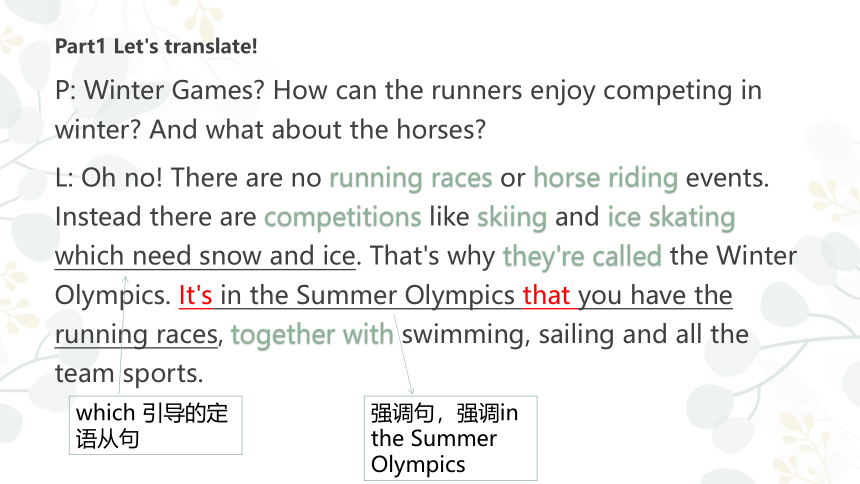
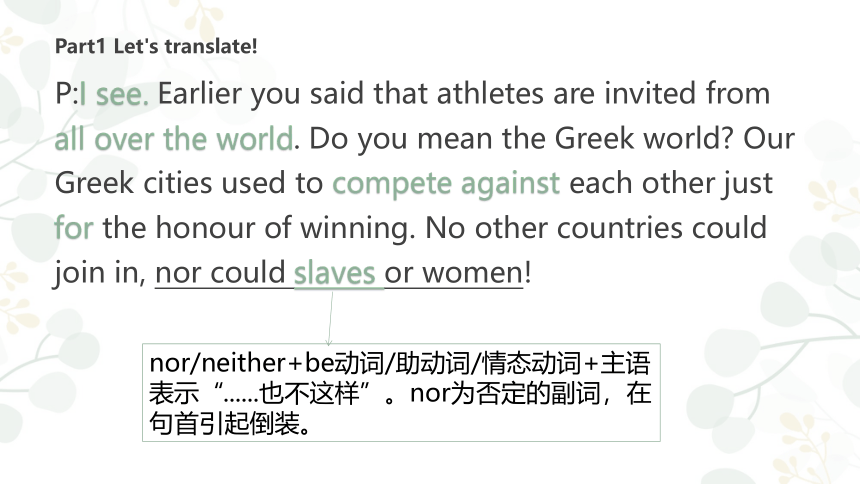
文档简介
Language
Points
Unit
2
The
Olympic
Gams
Listen
to
the
tape
Part
1-Let's
translate!
Part
1-Let's
translate!
Pausanias,
who
was
a
Greek
writer
about
2,000
years
ago,
has
come
on
a
magical
journey
on
March
18th,
2007
to
find
out
about
the
present-day
Olympic
Games.
He
is
now
interviewing
Li
Yan,
a
volunteer
for
the
2008
Olympic
Games.
who
引导的非限制性定语从句,修饰Pausanias
动词不定式短语表目的
具体日期前用介词on
now,
现在进行时,
be
+v-ing
Part1
Let's
translate!
P:
My
name
is
Pausanias.
I
lived
in
what
you
call
“Ancient
Greece”and
I
used
to
write
about
the
Olympice
Games
a
long
time
ago.
I've
come
to
your
time
to
find
out
about
the
present-
day
Olympic
Games
because
I
know
in
2004
they
held
in
my
homeland.
May
I
ask
you
some
questions
about
the
modern
Olympics?
what
引导的名词性从句,做in的宾语
Part1
Let's
translate!
L:
Good
heavens!
Have
you
really
come
from
so
long
ago?
But
of
course
you
can
ask
any
questions
you
like.
What
would
you
like
to
know?
P:
How
often
do
you
hold
your
Games?
Part1
Let's
translate!
L:
Every
four
years.
There
are
two
main
sets
of
Games--the
Winter
and
the
Summer
Olympics,
and
both
are
held
every
four
years
on
a
regular
basis.
The
Winter
Olympics
are
usually
held
two
years
before
the
Summer
Games.
Only
athletes
who
have
reached
the
agreed
standard
their
event
will
be
admitted
as
competitors.
They
may
come
from
anywhere
in
the
world.
同位语
定语从句,修饰athletes
Part1
Let's
translate!
P:
Winter
Games?
How
can
the
runners
enjoy
competing
in
winter?
And
what
about
the
horses?
L:
Oh
no!
There
are
no
running
races
or
horse
riding
events.
Instead
there
are
competitions
like
skiing
and
ice
skating
which
need
snow
and
ice.
That's
why
they're
called
the
Winter
Olympics.
It's
in
the
Summer
Olympics
that
you
have
the
running
races,
together
with
swimming,
sailing
and
all
the
team
sports.
which
引导的定语从句
强调句,强调in
the
Summer
Olympics
Part1
Let's
translate!
P:I
see.
Earlier
you
said
that
athletes
are
invited
from
all
over
the
world.
Do
you
mean
the
Greek
world?
Our
Greek
cities
used
to
compete
against
each
other
just
for
the
honour
of
winning.
No
other
countries
could
join
in,
nor
could
slaves
or
women!
nor/neither+be动词/助动词/情态动词+主语
表示“......也不这样”。nor为否定的副词,在句首引起倒装。
Part1
Let's
translate!
L:Nowadays
any
country
can
take
part
if
their
athletes
are
good
enough.
There
are
over
250
sports
and
each
one
has
its
own
standard.
Women
are
not
only
allowed,
but
play
a
very
important
role
in
gymnastics,
athletics,
team
sports
and...
Part1
Let's
translate!
P:Please
wait
a
minute!
All
those
events,
all
those
countries
and
even
women
taking
part
!
Where
are
all
the
athletes
housed?
L:
For
each
Olympics,
a
special
village
is
built
for
them
to
live
in,
a
main
reception
building,
several
stadiums
for
competitions,
and
a
gymnasium
as
well.
Part1
Let's
translate!
P:
That
sounds
very
expensive.
Does
anyone
want
to
host
the
Olympic
Games?
L:
As
a
matter
of
fact,
every
country
wants
the
opportunity.
It's
great
responsibility
but
also
a
great
honour
to
be
chosen.
There's
as
much
competition
among
countries
to
host
the
Olympics
as
to
win
Olympic
medals.
The
2008
Olympics
will
be
held
in
Beijing,
China.
Did
you
know
that?
as
much
+不可数名词+as
的结构,意思是“...和...(程度上)一样多”much表示程度
Part1
Let's
translate!
P:Oh
yes!
You
must
be
very
proud.
L:
Certainly.
And
after
that
the
2012
Olympics
will
be
held
in
London.
They
have
already
started
planning
for
it.
A
new
village
for
the
athletes
and
all
the
stadiums
will
be
built
to
the
east
of
London.
New
medals
will
be
designed
of
course
and...
时态:一般将来时
语态:被动语态
以上均为一般将来时的被动语态,表示“将要被...”
Part1
Let's
translate!
P:
Did
you
say
medals?
So
even
the
olive
wreath
has
been
replaced!
Oh
dear!
Do
you
compete
for
prize
money
too?
L:
No,
we
don't.
It's
still
all
about
being
able
to
run
faster,
jump
higher
and
throw
further.
That's
the
motto
of
the
Olympics,
you
know--”Swifter,
Higher
and
Stronger.”
P:
Well,
that's
good
news.
How
interesting!
Thank
you
so
much
for
your
time.
现在完成时的被动语态
Part
2-Let's
learn
more!
How
many
countires
competed
in
the
ancient
Olympic
Games?
P9
compete
in...参加某比赛
compete
against/with...与某人竞争
compete
for...为了...而竞争
In
this
competitive
world,
we
are
all
competitors
and
everybody
competes
with
each
other.
We
should
make
a
good
atmosphere
of
competition.
Practice
1.
Athlets
take
part
in
the
Olympic
Games
and
___
___the
honor
of
winning.
2.
Life
is
like
a
long
race
where
we
___
___
others
to
go
beyond
ourselves.
3.
More
than
300
students
competed
___
each
other
this
time
only
___three
pete
for
compete
with
with
;
for
Who
could
not
take
part
in
the
ancient
Olympic
Games?
{5C22544A-7EE6-4342-B048-85BDC9FD1C3A}take
part
in
有组织
有作用
join
in
加入活动
join
in
the
game
join
加入组织/团体
join
the
army/the
Party/the
League
attend
出席meeting/wedding/lecture/class/funeral/ceremony等
Practice
1
My
sister__________the
League
last
month
and
she
decided
to
_______the
activities
to
help
the
aged
as
a
volunteer.
2
I
shall
______an
important
conference
next
week.
joined
join
in/take
part
in
attend
There
are
two
main
sets
of
Games...on
a
regular
basis.
regular
adj.规则的,定期的,常规的
a
regular
square
shape规则的正方形
hold
regular
meetings
定期开会
a
regular
job固定的工作
regular
opening
hours正常营业时间
That's
why
they're
called
the
Winter
Olympics.
P10
That's
why...“那就是...的原因”
That's
why
he
is
highly
thought
of
in
the
company.
That's
why
we
take
part
in
school
activities.
区分That's
because...“那是因为”
Tom
was
late
for
work
this
morning.
That's
because
he
got
up
late.
Practice
单句写作
Jack没参加运动会。因为他生病了。
(用that's
why和that's
because
分别造句)
Jack
didn't
take
part
in
the
sports
meeting.
That's
because
he
was
ill.
Jack
was
ill.
That's
why
he
didn't
take
part
in
the
sports
meeting.
No
other
countries
could
join
in,
nor
could
slaves
or
women!P10
Nor/Neither
+情态动词/助动词/be+主语
“另一者也不......”前文的否定也适用于后者。
John
can't
ride
a
horse;
neither/nor
can
I.
If
you
don't
take
part
in
the
sports
meeting,
nor/neither
will
I.
拓展
1
So
+情态动词/助动词/be+主语
“......也是”前文的肯定也使用于后者。
Jack
volunteered
to
help
the
old
man.
So
did
Jim.
2
So
+主语+情态动词/助动词/be
“......的确如此”肯定前者的说法
--It
is
cold
today.
--Yes,
so
it
is.
Practice
1
He
isn't
fond
of
this
painting;_______________________________
(我也不喜欢)
2
Jack
likes
swimming._________________
(我也喜欢)
Nor
am
I./
Neither
am
I
So
do
I
Part
3-Let's
exercise
more!
Finish
the
exercises
on
Page
12
of
our
book.
Part
4-Summary
and
Homework
Homework
1
熟读课文Line1
to
Line
28
2
完成练习册
Thankyou!
Points
Unit
2
The
Olympic
Gams
Listen
to
the
tape
Part
1-Let's
translate!
Part
1-Let's
translate!
Pausanias,
who
was
a
Greek
writer
about
2,000
years
ago,
has
come
on
a
magical
journey
on
March
18th,
2007
to
find
out
about
the
present-day
Olympic
Games.
He
is
now
interviewing
Li
Yan,
a
volunteer
for
the
2008
Olympic
Games.
who
引导的非限制性定语从句,修饰Pausanias
动词不定式短语表目的
具体日期前用介词on
now,
现在进行时,
be
+v-ing
Part1
Let's
translate!
P:
My
name
is
Pausanias.
I
lived
in
what
you
call
“Ancient
Greece”and
I
used
to
write
about
the
Olympice
Games
a
long
time
ago.
I've
come
to
your
time
to
find
out
about
the
present-
day
Olympic
Games
because
I
know
in
2004
they
held
in
my
homeland.
May
I
ask
you
some
questions
about
the
modern
Olympics?
what
引导的名词性从句,做in的宾语
Part1
Let's
translate!
L:
Good
heavens!
Have
you
really
come
from
so
long
ago?
But
of
course
you
can
ask
any
questions
you
like.
What
would
you
like
to
know?
P:
How
often
do
you
hold
your
Games?
Part1
Let's
translate!
L:
Every
four
years.
There
are
two
main
sets
of
Games--the
Winter
and
the
Summer
Olympics,
and
both
are
held
every
four
years
on
a
regular
basis.
The
Winter
Olympics
are
usually
held
two
years
before
the
Summer
Games.
Only
athletes
who
have
reached
the
agreed
standard
their
event
will
be
admitted
as
competitors.
They
may
come
from
anywhere
in
the
world.
同位语
定语从句,修饰athletes
Part1
Let's
translate!
P:
Winter
Games?
How
can
the
runners
enjoy
competing
in
winter?
And
what
about
the
horses?
L:
Oh
no!
There
are
no
running
races
or
horse
riding
events.
Instead
there
are
competitions
like
skiing
and
ice
skating
which
need
snow
and
ice.
That's
why
they're
called
the
Winter
Olympics.
It's
in
the
Summer
Olympics
that
you
have
the
running
races,
together
with
swimming,
sailing
and
all
the
team
sports.
which
引导的定语从句
强调句,强调in
the
Summer
Olympics
Part1
Let's
translate!
P:I
see.
Earlier
you
said
that
athletes
are
invited
from
all
over
the
world.
Do
you
mean
the
Greek
world?
Our
Greek
cities
used
to
compete
against
each
other
just
for
the
honour
of
winning.
No
other
countries
could
join
in,
nor
could
slaves
or
women!
nor/neither+be动词/助动词/情态动词+主语
表示“......也不这样”。nor为否定的副词,在句首引起倒装。
Part1
Let's
translate!
L:Nowadays
any
country
can
take
part
if
their
athletes
are
good
enough.
There
are
over
250
sports
and
each
one
has
its
own
standard.
Women
are
not
only
allowed,
but
play
a
very
important
role
in
gymnastics,
athletics,
team
sports
and...
Part1
Let's
translate!
P:Please
wait
a
minute!
All
those
events,
all
those
countries
and
even
women
taking
part
!
Where
are
all
the
athletes
housed?
L:
For
each
Olympics,
a
special
village
is
built
for
them
to
live
in,
a
main
reception
building,
several
stadiums
for
competitions,
and
a
gymnasium
as
well.
Part1
Let's
translate!
P:
That
sounds
very
expensive.
Does
anyone
want
to
host
the
Olympic
Games?
L:
As
a
matter
of
fact,
every
country
wants
the
opportunity.
It's
great
responsibility
but
also
a
great
honour
to
be
chosen.
There's
as
much
competition
among
countries
to
host
the
Olympics
as
to
win
Olympic
medals.
The
2008
Olympics
will
be
held
in
Beijing,
China.
Did
you
know
that?
as
much
+不可数名词+as
的结构,意思是“...和...(程度上)一样多”much表示程度
Part1
Let's
translate!
P:Oh
yes!
You
must
be
very
proud.
L:
Certainly.
And
after
that
the
2012
Olympics
will
be
held
in
London.
They
have
already
started
planning
for
it.
A
new
village
for
the
athletes
and
all
the
stadiums
will
be
built
to
the
east
of
London.
New
medals
will
be
designed
of
course
and...
时态:一般将来时
语态:被动语态
以上均为一般将来时的被动语态,表示“将要被...”
Part1
Let's
translate!
P:
Did
you
say
medals?
So
even
the
olive
wreath
has
been
replaced!
Oh
dear!
Do
you
compete
for
prize
money
too?
L:
No,
we
don't.
It's
still
all
about
being
able
to
run
faster,
jump
higher
and
throw
further.
That's
the
motto
of
the
Olympics,
you
know--”Swifter,
Higher
and
Stronger.”
P:
Well,
that's
good
news.
How
interesting!
Thank
you
so
much
for
your
time.
现在完成时的被动语态
Part
2-Let's
learn
more!
How
many
countires
competed
in
the
ancient
Olympic
Games?
P9
compete
in...参加某比赛
compete
against/with...与某人竞争
compete
for...为了...而竞争
In
this
competitive
world,
we
are
all
competitors
and
everybody
competes
with
each
other.
We
should
make
a
good
atmosphere
of
competition.
Practice
1.
Athlets
take
part
in
the
Olympic
Games
and
___
___the
honor
of
winning.
2.
Life
is
like
a
long
race
where
we
___
___
others
to
go
beyond
ourselves.
3.
More
than
300
students
competed
___
each
other
this
time
only
___three
pete
for
compete
with
with
;
for
Who
could
not
take
part
in
the
ancient
Olympic
Games?
{5C22544A-7EE6-4342-B048-85BDC9FD1C3A}take
part
in
有组织
有作用
join
in
加入活动
join
in
the
game
join
加入组织/团体
join
the
army/the
Party/the
League
attend
出席meeting/wedding/lecture/class/funeral/ceremony等
Practice
1
My
sister__________the
League
last
month
and
she
decided
to
_______the
activities
to
help
the
aged
as
a
volunteer.
2
I
shall
______an
important
conference
next
week.
joined
join
in/take
part
in
attend
There
are
two
main
sets
of
Games...on
a
regular
basis.
regular
adj.规则的,定期的,常规的
a
regular
square
shape规则的正方形
hold
regular
meetings
定期开会
a
regular
job固定的工作
regular
opening
hours正常营业时间
That's
why
they're
called
the
Winter
Olympics.
P10
That's
why...“那就是...的原因”
That's
why
he
is
highly
thought
of
in
the
company.
That's
why
we
take
part
in
school
activities.
区分That's
because...“那是因为”
Tom
was
late
for
work
this
morning.
That's
because
he
got
up
late.
Practice
单句写作
Jack没参加运动会。因为他生病了。
(用that's
why和that's
because
分别造句)
Jack
didn't
take
part
in
the
sports
meeting.
That's
because
he
was
ill.
Jack
was
ill.
That's
why
he
didn't
take
part
in
the
sports
meeting.
No
other
countries
could
join
in,
nor
could
slaves
or
women!P10
Nor/Neither
+情态动词/助动词/be+主语
“另一者也不......”前文的否定也适用于后者。
John
can't
ride
a
horse;
neither/nor
can
I.
If
you
don't
take
part
in
the
sports
meeting,
nor/neither
will
I.
拓展
1
So
+情态动词/助动词/be+主语
“......也是”前文的肯定也使用于后者。
Jack
volunteered
to
help
the
old
man.
So
did
Jim.
2
So
+主语+情态动词/助动词/be
“......的确如此”肯定前者的说法
--It
is
cold
today.
--Yes,
so
it
is.
Practice
1
He
isn't
fond
of
this
painting;_______________________________
(我也不喜欢)
2
Jack
likes
swimming._________________
(我也喜欢)
Nor
am
I./
Neither
am
I
So
do
I
Part
3-Let's
exercise
more!
Finish
the
exercises
on
Page
12
of
our
book.
Part
4-Summary
and
Homework
Homework
1
熟读课文Line1
to
Line
28
2
完成练习册
Thankyou!
